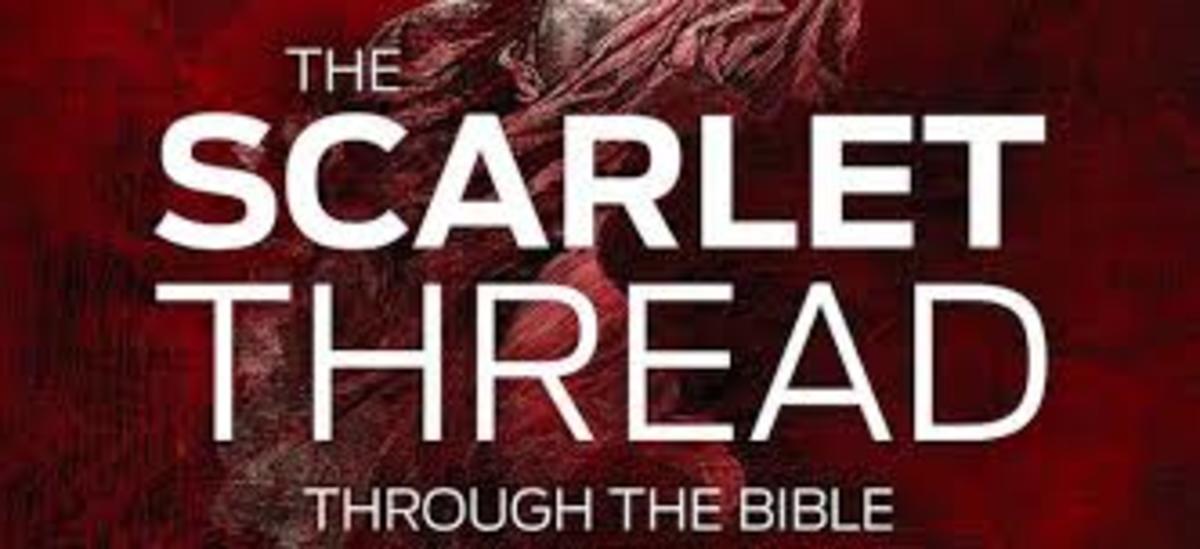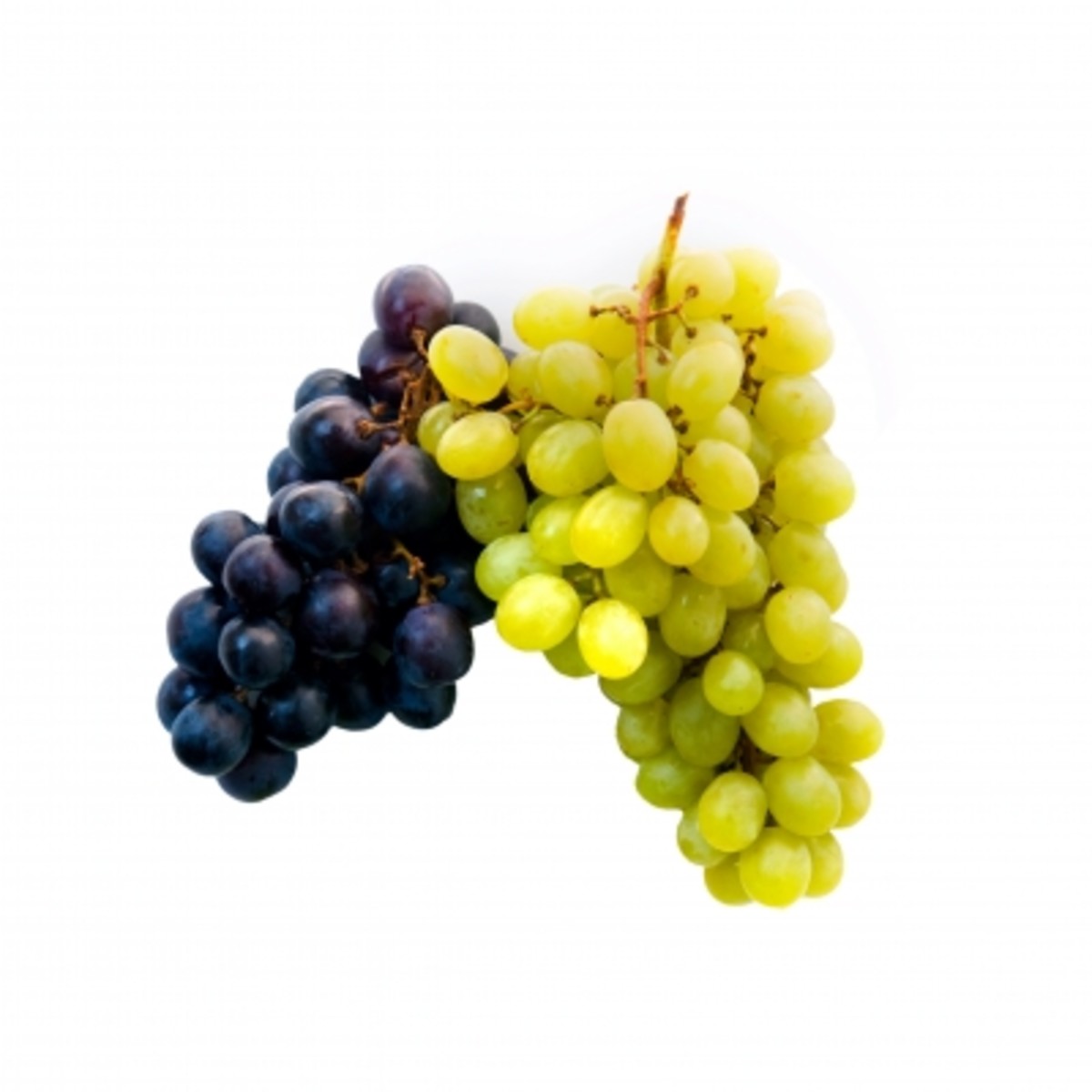ISRAEL: SEVEN SPECIES (3) GRAPES (VINE)
Grapes
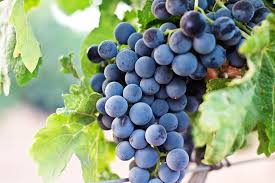
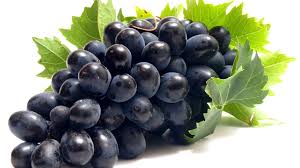
Grapes and wine have always been an important part of life in Israel. When Moses sent spies to explore the Promised Land, two of the spies returned with grapes so large that they had to carry it together. Jewish ritual blesses the fruit of the vine on the Sabbath and Holidays during the Kiddush prayer. Ancient coins and jars are frequently decorated with grape clusters and vines attesting to its popularity and value. The popularity of wine today has led to the establishment of hundreds of wineries in Israel, ranging from small boutiques to large scale enterprises. Stuffed grape leaves, filled with meat and rice are often served as a first course in Israeli meals.
THE OLD TESTAMENT
THE SEVEN SPECIES AND TU B'SHVAT
On Tu B'Shvat, the Jewish New Year for trees, it has become customary to eat and bless the seven species.
- wheat (chitah)
- barley (se'orah)
- grapes (gefen)
- fig (te'enah)
- pomegranate (rimon)
- olive (zayit)
- date (tamar)
CONNECTING TO ISRAEL THROUGH THE SEVEN SPECIES
My Seven Species
by Laura Tinter
My Seven Species
“seasons” are as follows:
Rimon Season (pomegranate) —
September/October —
Rosh
Hashanah/Yom Kippur/Sukkot

GEFEN (GRAPES) SEASON
When Adar arrives, the month when we are commanded to be joyful, we can discuss the grape, used to make wine, the symbol of our joy. Kiddush and wine (and grape juice) are central to all Jewish smachot , because they are holy, sanctified beverages with a blessing all their own. Wine has been set apart by God for service to God, just as the Jewish people have been set apart for service to God. The “hagafen ” blessing is for grape juice and wine only. For plain grapes or raisins,use the “ha-etz ” blessing. No other beverage is blessed by referencing how it grows; they are blessed using“shehakol .”
The role of the seven species in the battle for monotheism becomes even more apparent with the revelation that only they could brought as offerings of the first fruits (bikkurim ) to the Temple in Jerusalem. The Mishna[2] tells us "One does not bring offerings of the bikkurim (first fruits) except from the seven species." In this way the Mishna elaborates on the Biblical verses, which say: "The first of the bikkurim of your land you shall bring into the house of the Lord your God";[3] and "You shall take some of the first of all the fruit of the earth that you harvest from your land that the Lord your God is giving you...[4]
THE SEVEN SPECIES OF THE LAND OF ISRAEL
The Seven Species of the Land of Israel by Nogah Hareuvenl
Of the seven species, four have the greatest importance in the land of Israel: wheat, barley, grapes and olives. These four are mentioned throughout the Bible by the names grain (wheat and barley), wine (from grapes), and oil (from olives).
Because these are the main representatives of the seven species, in whose successful growth lay those pitfalls that could lure the Israelites to worship other gods, grain, wine and oil were included in the passage in Deuteronomy 11: "If you pay heed to the commandments that I give you this day... I will give the rain...that you may gather in your grain, your wine and your oil," words the Israelites were commanded to recite morning and evening and to write upon the doorposts of their houses and upon the gates of their cities.[9]
THE GRAPEVINE - PRIDE OF THE HOLY LAND
Chabad.Org The Grapevine - Pride of the Holy Land
The Torah is Likened to Wine
Wine is one of those rare things, which improve with age. This is one of the reasons why the Torah and Torah-scholars are likened to wine; the more Torah one studies and the older one gets, the more mature and rich is one's knowledge and wisdom. Commenting on verse 2 of Shir HaShirim ("Thy love is better than wine") - and let it be remembered that the whole of Shir HaShirim is the great expression of the sacred love and longing of the Jewish people towards G-d - our Sages say that the words of the Torah are compared with wine, because just as wine, which grows old in a bottle, becomes more valuable, so the words of the Torah; as man grows older, are more appreciated. Moreover, they say, just as "wine cheers the heart of mortals" (Psalms 104:15), so do the commandments of the Torah rejoice the heart (Psalms 19:9). In another passage (Si/re, Deut. Ekev, ch. 48) , our Sages declare: "As wine cannot keep good in vessels of gold and silver, but only in cheap earthen-ware vessels, so the words of the Torah keep good only with him who makes himself humble; like wine, words of the Torah rejoice the heart; as wine grows better with age, so the words of the Torah become better as a man grows older."
The Jewish people have been likened by the Prophet Hosea to a "luxuriant vine" (Hosea 10: 1) , laden with an abundance of Juicy fruits. The same prophet said: "Like grapes in the desert have I found Israel" (9:10). What could be more welcome than refreshing grapes in the wilderness? The Prophet Isaiah (chapter 5) speaks of his people as the 'Vineyard of G-d," and rebukes the sinners who are a disappointment to G-d as sour grapes to a vintner.
The American Jewish Joint Distribution Committee
Text 40.
The grapevine is like a human community. The leaves are like the amei ha'artzot , the people of the land, who work the land and provide food for all, as the leaves sustain the plant through photosynthesis. The branches, which distribute what the leaves produce to the entire plant, are like the merchants who distribute goods to the entire community. The tendrils, which fasten the grapevine to its support, are like those who produce neither goods nor scholarship, but have a function in the community. The bunches of grapes are like the scholars, who cannot survive without all the other parts of the grapevine/community. Chullin 92b
Text 41. Why are the people of Israel compared to a grapevine? When you want to improve it, you dig it up and you replant it elsewhere and it improves. So when God wanted to make Israel known in the world, what did God do? God uprooted them from Egypt and brought them to the wilderness when they flourished. They received the Torah and became known in the world. Shemot Rabba 44:1
JESUS, THE TRUE VINE
The true vine has two important qualities. First, Jesus alone is the way, the truth and the life to the Father (God) and the second is the vine dresser.
A. The True Vine
- Jesus alone possesses life within Himself, John 14:6. All other vines are fraudulent. He alone is the true source of everlasting, abundant life.
- Jesus saith unto him, I am the way, the truth, and the life: no man cometh unto the Father, but by me.
In John 15:1, Jesus also mentions that "I am the true vine, and my Father is the husbandman.
B. The Husbandman Of The True Vine
- "The "husbandman" refers to the vine dresser, the gardener, the one who has the responsibility of caring for the vineyard. Jesus says that the Heavenly Father is the Gardener.
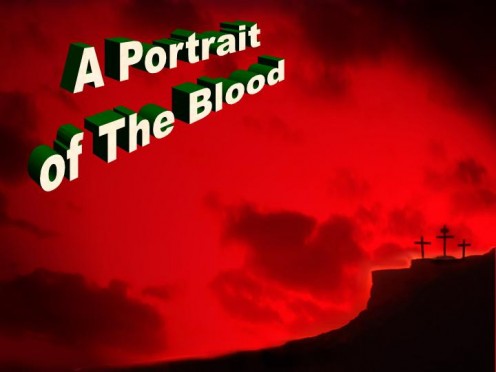
GRAPES SYMBOLISM IN THE NEW TESTAMENT
GRAPES and *vines are among the most frequent and important symbols in early Christian and medieval art. Often used in the Old Testament as symbols of God’s relationship with the Israelites, the vine became the emblem of Christ who, in *John 15:1, referred to himself as the “true vine.” The infant Jesus may thus be depicted with a bunch of grapes, this also signifying the wine symbolic of Christ’s blood partaken at the *Last Supper. Figures or *angels harvesting grapes may symbolize the *Last Judgment as described in the *Apocalypse where a great winepress signifies God’s anger at injustice . The *Cross and Tree of Life may be represented as, or with, grape vines."
IMPORTANCE OF BLOOD
MAGNIFICENT WHOLENESS INTERNATIONAL
Blood sustains life. It delivers oxygen, nutrients and other essential substances, including vitamins and medicines to the different cells and tissues of the body. A deficiency in the supply or quality of blood will impair the quality of life and even compromise life itself. For example, if oxygen does not reach the brain, the lack of it would cause death within three minutes. Blood also removes carbon dioxide and other harmful wastes, which in turn are eliminated by the different organs of the body.
The white blood cells defend the body against infections and injuries. If the organs and the tissues lack the proper supply of blood, bodily functions would break down, hampering mental functions, triggering emotional changes, and even causing debilitating diseases.
Church & Israel Forum
THE GREAT IMPORTANCE OF BLOOD ATONEMENT
Blood was very sacred to the Jews of Bible times. They considered that blood contained the life, and they got this idea from scripture. In Deuteronomy 12:23 we read: "But be sure you do not eat the blood, because the blood is the life, and you must not eat the life with the meat." Obviously this was not just a temporary understanding as we see in Leviticus 3:17: "This is a lasting ordinance for the generations to come, wherever you live: You must not eat any fat or any blood." We even see the understanding of the sacredness of blood passed on by the apostles to the early church in Acts 15:29: "You are to abstain from food sacrificed to idols, from blood, from the meat of strangled animals and from sexual immorality. You will do well to avoid these things."
ATONING BLOOD OF JESUS CHRIST IN HOLY COMMUNION
In the Holy Communion, the grape juice represents the atoning blood of Jesus. Whenever we partake of the vine, we remember His sacrifice for our sin, and remember Jesus' death and the blood He shed. Blood is essential for good health because the body depends on a steady and constant supply of fuel and oxygen to reach its billions of cells in the body to keep it alive. We keep ourselves alive by partaking the blood of Jesus until He comes again to judge the world. Man tend to forget things, but keeping the Holy Communion reminds us constantly of Jesus Christ.
When you cease taking the blood of Christ, you stop the blood flow of the Lord in you. You have no life, and without blood in the body, you are dead.
The cup signifies that the Lord shed His blood for us (1 Cor 11:25; Lk 22:20).
- This cup is the new testament in my blood: this do ye, as oft as ye drink it, in remembrance of me.
Those who eat the flesh and drink the blood of the Lord Jesus will have everlasting life, and will be raised up on the last day (John 6:53-54).
- Then Jesus said unto them, Verily, verily, I say unto you Except ye eat the flesh of the Son of man, and drink his blood, ye have no life in you.
- Whoso eateth my flesh, and drinketh my blood, hath eternal life; and I will raise him up at the last day.
The Lord Jesus said, "He that eateth my flesh, and drinketh my blood, dwelleth in me, and I in him" (John 6:56 ).
BIBLE VERSES ON GRAPE JUICE IN HOLY COMMUNION
In the New Testament, Jesus replaces the sacrificial lamb of the Old Testament for He was sacrificed for our sin. No longer is a lamb sacrificed. When we partake of the Bread and Wine, we are eating Christ's body and drinking His blood in rememberance of Jesus.
The three verses of scripture reveal the drinking of grape juice and not fermented wine as written in the Bible. Three apostles, Matthew, Mark and Luke attested to the veracity of the truth.
Matthew 26:29
- But I say to you, I will not drink henceforth of this fruit of the vine, until that day when I drink it new with you in my Father's kingdom."
Mark 14:25
- For I say unto you, I will drink no more of the fruit of the vine until that day I drink it new in the kingdom of God.
Luke 22:18
- For I say unto you, I will not drink of the fruit of the vine, until the kingdom of God shall come.
CHRISTIANITY AND ALCOHOL
WIKIPEDIA CHRISTIANITY AND ALCOHOL
Grape juice, because of its non-alcoholic content, is commonly used by Christiandenomination (such as Baptists and Methodists who oppose the partaking of alcoholic beverages, as the "cup" or "wine" in the Lord's Supper.
Although alcohol is permitted in Judaism grape juice is sometimes used as an alternative for kiddush on Shabbat and Jewish holidays and it has the same blessing as wine. However, many authorities maintain that grape juice must be capable of turning into wine naturally in order to be used for kiddush. Common practice, however, is to use any grape juice for kiddush.
IMPORTANT TO PARTAKE OF THE CUP
It is vitally important to drink the cup of vine (grape juice) representing the blood of Jesus Christ for the blood sustains our life on earth. While we drink His blood, we have life in Him.
John 6:53, 56
- Then Jesus said unto them, Verily, verily, I say unto you, Except ye eat the flesh of the Son of man, and drink his blood, ye have no life in you.
- He that eateth my flesh and drinketh my blood, dwelleth in me, and in him.
The contrast is that we must abstain from drinking blood, and from things strangled, for blood is life. We cannot take away life but the blood of Jesus gives us life, so we must constantly partake of His blood to keep the blood flowing constantly in our bodies..
How to Prepare Fresh Figs Video | MyRecipes.com
► 0:38► 0:38www.myrecipes.com › How To › How-To VideoJust a rinse and a simple twist is all you need to do to enjoy fresh fig
RELATED TOPICS
ISRAEL: SEVEN SPECIES (1) WHEAT http://hubpages.com/hub/israelsevenspecieswheat http://hubpages.com/t/12d759
ISRAEL: SEVEN SPECIES (2) BARLEY http://hubpages.com/hub/israelsevenspeciesbarley http://hubpages.com/t/131f4b
ISRAEL: SEVEN SPECIES (3) GRAPES (VINE) http://hubpages.com/hub/israelsevenspeciesgrapes http://hubpages.com/t/14e01e
ISRAEL: SEVEN SPECIES (4) FIG http://hubpages.com/hub/israelsevenspeciesfig
ISRAEL: SEVEN SPECIES (6) OLIVE http://hubpages.com/hub/israelsevenspeciesolive
ISRAEL: SEVEN SPECIES (7) HONEY http://hubpages.com/hub/israelsevenspecieshoney
Israel: Seven Species (3) Grapes (Vine)
Do you know that grapes (vine) symbolizes the blood of Jesus? It is God's love that grapes were already there in the Promised Land.
einron latest
- Israel. Seven Species. Fruits and Vegetables of Holy...
The Hebrew Bible (TANAKH) describes Israel as a land blessed with seven fruits and grains: - ISRAEL: SEVEN SPECIES (2) BARLEY
Barley is the second of the seven species of food given to the Israelites when they reached the Promised Land. It is a grain cultivated in Israel. "For the Lord thy God bringeth thee into a good land, a land...
© 2010 einron


